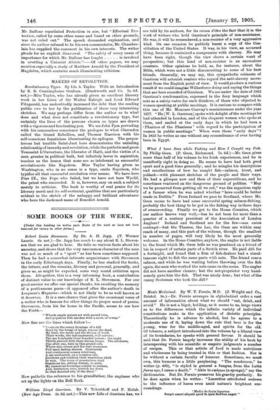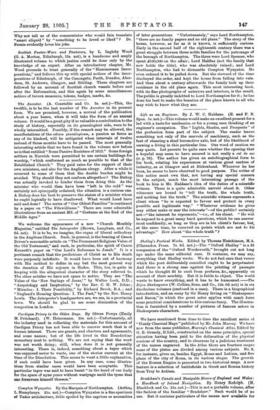Meals Medicinal. By W. T. Fernie, M.D. (J. Wright and
Co., Bristol. 9s.)—Dr. Fernie arranges in alphabetical order a vast amount of information about what we should "eat, drink, and avoid." He is not a bigot, holding, as it seems to us, large views as to the differences which the infinite variety of individual constitutions make in the application of dietetic principles. Theoretically he is adverse to alcohol, but he agrees to a moderate use of it, laying down the rule that beer is for the young, wine for the middle-aged, and spirits for the old. Of tobacco, a subject introduced into the volume by a liberal view- of its boundaries, he speaks with general favour. It should be said that Dr. Fernie largely increases the utility of his book by interspersing with his scientific or empiric judgments a number of recipes. This or that article of food is made nutritious and wholesome by being treated in this or that fashion. Nor is without a certain faculty of humour. Sometimes, we musb own, this humour is a little perplexing. " The mushroom," he writes (p. 499), "is styled in general a fungus, from the Latin _fumes ago, I cause a death." "Akin to aitutyros(a sponge)," any the, dictionaries. But Dr. Fernie preserves his gravity perfectly.. So he does again when he writes : "Lucretius attributed sadness to the influence of hares even amid nature's brightest sur- rcamdings.
' Medic de fonts leporum Snrgit smart *liquid quodin ipsisitoribus angst." Why not tell us of the commentator who would fain translate "amari aliquid " by " something to be loved or liked" ? Dr. Fernie evidently loves his joke.























































 Previous page
Previous page